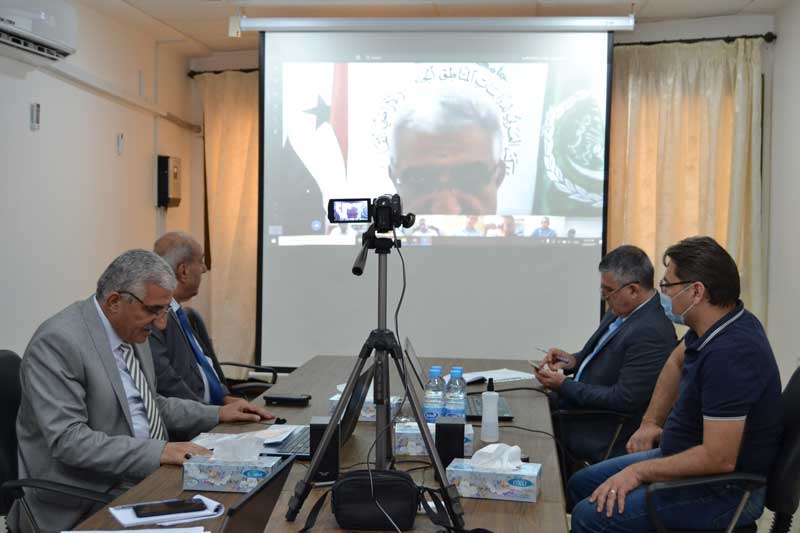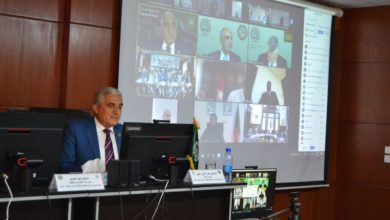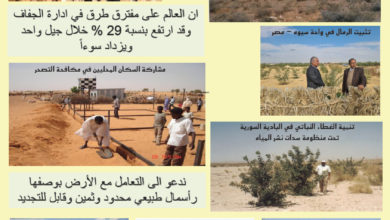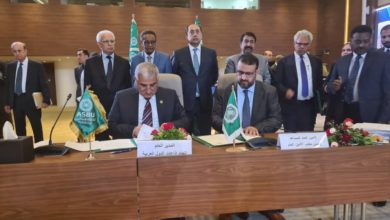ACSAD organization holds a workshop on the impact of the Corona pandemic on Indicative work in the Arab region and coping mechanisms.
The Director-General of the Arab Center for the Studies of Arid Zones and Drylands(ACSAD) Dr. Nasr Eddin Al Obaid emphasized the importance of agricultural extension in transferring modern agricultural technologies to farmers and in transmitting the correct information to rural people about the Corona pandemic.
In a speech at the opening of the workshop on “the impact of the Corona pandemic on the extension work in the Arab region and coping mechanisms” which held recently by ACSAD via video technology; Dr. Al Obaid referred that The agricultural extension should play an active and exceptional role during this period to sensitize rural populations to the way of confronting and limit its effects, explaining the research and humanitarian activities carried out by ACSAD since the outbreak of this epidemic.
He urged the participants to develop their extension work in an integrated way among the Arab countries, taking advantage of the great scientific development of communication and information technology, and he urged them to reach innovative recommendations that are applicable in our Arab reality and rise to the level of crisis. He also thanked the General Secretariat of the League of the Arab States and the Arab Ministers of Agriculture for what they provide generous support to ACSAD.
The workshop was attended by 12 directors and experts in agricultural extension from 10 Arab countries, Syria, Lebanon, Palestine, Jordan, Iraq, Saudi Arabia, Yemen, Libya, Tunisia, and Algeria. Dr. Abdul Rahman Al-Khaldi, Agricultural Extension Professor at Al-Furat University – Al-Hasakah, Syria, also participated in it.
The workshop activities included many essential themes, including the impact of the COVID -19 crisis on the extension work in the Arab countries, strategies for communicating with farmers under the COVID-19 crisis, the reality of digital extension, communication, and information technology in the Arab countries, and the experiences and expertise of the Arab countries during the Corona crisis.
The head of the Agricultural Extension Department at ACSAD, Dr. Mohamed Al Abdullah presented a paper on the agriculture extension under the Corona pandemic, in which he explained the impact of this pandemic on Arab food security and the strategies required to reduce its effects, with a focus on the role of communication and information technology in modern extension work, especially during the Corona crisis; he also presented some recommendations in this field.
Dr. Talal Al-Razouk, an agriculture extension expert in ACSAD, also presented a paper on agricultural extension experiments in some Arab and foreign countries in helping to confront the pandemics and crises, lessons learned, and suggested strategies.
Then the interventions were opened for the participants, where they offered oral interventions, spoken about their countries’ experiences, the role of the agricultural extension during the pandemic outbreak, and the followed agriculture extension methods and techniques used to communicate with farmers in transferring the agrarian technologies.
The interventions showed the impact of agricultural extension work in all countries and the decline in direct contact with farmers. However, the effect of the pandemic was reduced by the use of communication and information technology, as Saudi Arabia offered a leading Internet experience by designing an electronic platform (mobile application) named “your agricultural guide” where 300 experts from all agricultural fields and domains are working in
The application can be loaded on the mobile for all interested parties. Through this application, all the guidance, marketing, logistics, and administrative services are provided to all users (farmers, Ministry of Agriculture employees), by answering questions by specialists and providing reliable information to users.
The representatives of Iraq, Yemen, Tunisia, and Algeria also referred to the use of agricultural extension platforms supported by some international organizations, and the representative of Syria requested assistance from ACSAD in establishing an electronic platform for the agricultural extension in his country.
In conclusion, the participants reached many recommendations, namely the need for the Arab Center (ACSAD) to follow the pioneering role in benefiting from successful Arab and international experiences in coping to the Corona pandemic, the continuous flow of agricultural and medical information related to the virus to the rural populations, and generalizing the successful experiences to the Arab extension institutions.
They also referred to the negative effects of the spread of the COVID-19 pandemic requires rapid and effective action by extension institutions to help their farmers and keep their livelihoods continuous, by raising their awareness of the effects of the virus outbreak and reducing its spread among rural populations.
They also recommended the development of organizational structures and working mechanisms for action in Arab agricultural extension institutions, in line with the accelerating developments in the communications world, as well as the building of more active and effective outreach programs that will continue to operate smoothly in crises, thereby helping in disease management efforts, while continuing to support agricultural processes and avoiding food insecurity.
The participants recommended that additional efforts should be made to increase the capabilities and skills of agricultural guides in the Arab countries to employ and use communication and information technology in extension work, smartphone applications and to benefit from the widespread of the Internet and social media.
They called for encouraging extension institutions in the Arab countries to establish electronic platforms (mobile applications) for agricultural extension, by employing the expertise of ACSAD and its capabilities to play a distinct role in implementing pilot projects and country-level guidance activities that achieve the scientific goal at the lowest cost, by taking advantage from the properties of communication and information technology.
Furthermore, to work on new methodologies by designing and developing smart extension agricultural applications for farmers and deploying it among them, enabling them to use it effectively, approved it as an essential guide in diagnosing their agricultural problems, and communicating with specialists to solve it.
The participants stressed the necessity and importance of adopting agricultural extension systems in the Arab countries’ on smart agricultural technology (early warning stations for pests and drought, remote sensing) that helps them understand the rural environment and make timely decisions.




